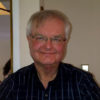How God Used a Handful of Humble Men to Launch Promise Keepers Canada
It was September 1993, Tom Iwama, a family doctor from Surrey, BC, was sitting alone among 50,000 other men inside the packed-out Folsom Stadium at the University of Colorado in Boulder. They had gathered for the Promise Keepers’ annual conference. In just three years since its founding, the men’s ministry was catching fire across the United States and around the world. When he learned about the conference, Iwama — already burdened by the lack of men’s ministries in most Canadian churches—felt God was calling him to attend.
“I was there all by myself, because I didn’t know anybody else that would go with me,” he says. “And I’m sitting in this hot stadium with 50,000 other guys listening to speakers and worshiping with them—and out of the blue I felt a very strong stirring in my heart that God was asking me to bring a ministry like Promise Keepers to Canada to go across the nation.”
Wanting to obey God’s call and not knowing what else to do, Iwama ordered videotapes of the six conference speakers. Back home, he gathered together seven other men who, along with their wives, committed to pray that a nation-wide ministry to men would be birthed. Every two weeks, they met at Iwama’s church to watch one of the conference videos.
“At the conclusion of these six meetings— and we didn’t know what we were doing, we didn’t know anything about marketing or promotions or anything—880 men showed up, all by word-of-mouth,” he says. “We really saw real transformation. I knew this really was a move of God. He just needed somebody to say ‘yes’ to get this thing started.”
Meanwhile, in Ontario, other men were resonating with the Promise Keepers message. In around 1991, London entrepreneur Randy Collins and his church’s men’s ministry pastor attended a PK training seminar in Detroit. They came back in tears. “A lot of it had to do with our relationship with our fathers,” he says. “Not that we had bad relationships with our fathers, but there seemed to be a lot of guys in our age group who were yearning for recognition from them. And Promise Keepers recognized that.”
It was also at a seminar in Detroit—and for a similar reason—that Kirk Giles was first introduced to Promise Keepers. “My Dad [Jim Giles] and I got involved in the ministry, because God actually used Promise Keepers to reconcile our relationship,” he says. “We started volunteering back in 1995, just as the ministry was starting in Canada.”
Kirk Giles [was] the president of Promise Keepers Canada [for 11 years].
Back in British Columbia, Iwama was wondering what to do next in light of the unexpected response to his six videotapes. PK USA advised him to plan a conference for people with a heart to lead a men’s ministry in their churches. He did, and “going out on a limb,” he says, he ordered three hundred leadership packets based on the calls he was getting from pastors across Metro Vancouver. The conference took place at Broadway Church in Vancouver.
“When we opened the doors, we had no registration, no way of knowing how many men would come,” Iwama recalls. “I had three hundred leadership packets ready to go—and close to a thousand guys showed up. They came from Newfoundland, New Brunswick, Quebec, Ontario, the Prairie provinces, from all over Canada.”
The next step was to bring some structure to what had suddenly become a national men’s movement. That meant forming a board of directors. Iwama recruited Roger Poirier, a logistics expert formerly with GM; Brian Warren, a recently-retired CFL all-star linebacker with a calling from God to become an evangelist; Ross Maracle, a television evangelist from the Mohawk First Nation in Ontario; Ken McGeorge, a hospital CEO in Fredericton, New Brunswick; and Bill Rutherford from Calgary, who became PK Canada’s first president. Iwama became the board’s first chair.
“We got together and the next thing we knew, we were running our own conference,” he says. “Red Deer, Alberta, was our first. We had no form of registration, and once again we didn’t know how many people are coming— and that stadium of maybe 6,000 was packed out.” Then came conferences at the Pacific Coliseum in Vancouver, the Saddledome in Calgary, as well as in Edmonton, Saskatoon, Hamilton, and Fredericton. “The ministry exploded far beyond what anybody could do. It was a movement of God.”
Collins recalls vividly the Hamilton gathering at the Copps Coliseum. Around 13,500 men showed up. “With our prayer team, we anointed every seat in that stadium. Touched every seat. We asked God for the Holy Spirit to be there and fill that place. There was so much ministry happening all over that place. It was a beautiful, beautiful time,” he says.
“God did this. All we had to do was do as we were told. And when we yield, He works.”
“The timing was right,” says David Sweet, an early PK supporter. “A good friend of mine and I were already doing men’s ministry in different churches all around southern Ontario. The Lord had prepared men’s hearts to really get serious about their faith. And as the old proverb says, ‘When the student is ready, the teacher arrives.’”
“God did this. All we had to do was do as we were told. And when we yield, He works.”
In September 1995, Promise Keepers Canada was formally launched with a worship service at Queensway Cathedral in Toronto, becoming PK’s first international affiliate. Initially it was headquartered in Langley, BC. In 1997, it relocated to Burlington, Ontario, when David Mainse, the founder of Crossroads Christian Communications and 100 Huntley Street—and “a friend of the ministry from the get-go,” says Iwama—gave them office space in his building.
But almost as soon as PK Canada was born, it nearly died. As a fledgling ministry, it was very much in the shadow of its American partners and their emphasis on big stadium events. (In 1996, they staged twenty-two conferences across the US that drew more than a million men.) PK Canada followed that model with events at hockey arenas. The problem was that between the high cost of running these events and no real donor base, they generated little or no income.
In October 1997, things went from bad to worse. At Stand in the Gap, a “sacred assembly” that Promise Keepers hosted in Washington, DC, that drew an estimated one million men, founder Bill McCartney announced that beginning in 1998, all their events would be free admission. That was the first the Canadians present had heard of it.
PKC reluctantly followed suit. “We didn’t have many options,” Giles says, “so we made all of our events for free even though we didn’t have the cash to do it. We lost a lot of money.”
In 1998, McGeorge, who had moved into an interim role as national coordinator replacing Rutherford, was introduced to Ron Hannah. He had recently left the corporate business world and was seeking a ministry opportunity. McGeorge asked him to study PK Canada’s financial woes and propose solutions. Hannah says it soon “became obvious that the ministry was virtually bankrupt and had outstanding debt to various suppliers.”
“PKC had a large following of men who loved the ministry, but other than attending a conference, there was no followup ministry happening,” he says. All it offered was a monthly speaker cassette tape that sold for $25.00.
Around the same time, the board named Sweet to serve as president. “The first two years were really tough,” he admits. “There were some days I wondered how, without help from the Lord, we were going to get through it.”
But together with Hannah, they developed a plan to pull PKC back from the brink. “We realized,” says Sweet, “that we really needed to focus on equipping local churches rather than the big events. We still had some, but we realized that we were supposed to be a resource ministry, not a big-event machine.”
“There were some days I wondered how, without help from the Lord, we were going to get through it.”
They replaced the tapes with WiseChoices materials—including New Man magazine, SEVEN’s predecessor—that would be free to men who could not afford it, while trusting the Lord, says Hannah, “to move the hearts of other men who could afford it to not only cover their own cost but, where possible, cover the costs of another brother who was in need.”
“Over the course of the following months and years,” he adds, “the WiseChoices program grew to several thousands of monthly members, and revenues far exceeded the cost. So much so that it became a key to providing the monthly revenue to help run the ministry.”
Sweet left the ministry in 2004 to pursue a career in politics. He is now the MP for Flamborough-Glanbrook in southwestern Ontario. Hannah replaced him as president, serving until 2009 when he retired. Then Giles took over.
“I can remember praying in those difficult early days,” Giles says, ‘God, let this ministry last long enough for all of my sons to be able to experience what it’s like to be surrounded by Godly men.’ Two years ago, I brought my youngest son to his first Promise Keepers event, and I remember having it hit me like a ton of bricks, this sense of how God answered this prayer I prayed all those years ago.”
About


